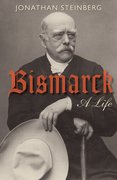The Telegraph Hay Festival is taking place from 23 May to 2 June 2013 on the edge of the beautiful Brecon Beacons National Park. We’re delighted to have many Oxford University Press authors participating in the Festival this year. OUPblog will be bringing you a selection of blog posts from these authors so that even if you can’t join us in Hay-on-Wye, you won’t miss out. Don’t forget you can also follow @hayfestival and view the event programme here.Jonathan Steinberg will be appearing at The Telegraph Hay Festival on Tuesday 28th May 2013 at 7 p.m. to speak about Otto Von Bismarck. More information and tickets.
By Jonathan Steinberg
An old English proverb claims that ‘no man is a hero to his valet’. In this, as in so many other respects, Otto von Bismarck defies the rule. In 1875, Christoph Willers von Tiedemann, a youngish Liberal member of the German parliament, became Bismarck’s first personal assistant; the job took up most of his time for the next six years. When he received a formal invitation to tea addressed to Privy Councillor Christoph von Tiedemann from his wife, complete with his home address to remind him where it was, he decided to resign. At the end of his service he sketched a portrait of his remarkable boss.
First his physical appearance — his tall frame, broad shoulders and great arms and legs, his high forehead and brilliant, expressive eyes made him an impressive figure. After the victories of the wars of unification, the Kaiser elevated him to the rank of active general in a cavalry regiment and that entitled him to wear the sulfur-yellow uniform of his regiment in which he dressed for the rest of his life. Bismarck once remarked to Tiedemann that his promotion gave him great pleasure because it liberated him from the daily struggle with stiff shirts, studs and celluloid collars. He had no personal vanity, never cared what he looked like, could not be bothered to sit for portraits and on the one occasion when he had to wear civilian dress at Bad Gastein looked so silly in a huge top hat that his wife forbade him to wear it. He had unusually full and bushy eyebrows. In Tiedemann’s Sechs Jahre Chef der Reichskanzlei unter dem Fürsten Bismarck he remembers,
“If he was excited or nervous, he tended to fiddle with the hair of his eyebrows the way some men play with their beards. When that happened, you had to reckon with a day of first-order difficulty…If I came in and noticed that the Prince had on his melancholy, world-weary expression, and stared out the window and twisted his eyebrows, I knew that a storm would burst any minute. I would raise an insignificant matter and usually got the answer, “don’t care; do what you think best.”
On other occasions, he would plunge into a complex matter and dictate for hours in nearly perfect prose. He reworked his speeches with the care of the great writer and played with ideas and phrases until he got them right. He took three days to find “the honest broker” to describe Germany’s role in the crisis that led to the Congress of Berlin. He spoke in the Reichstag or Landtag without complete texts and his vigorous, witty and lively prose just flowed.
He had incredible mental abilities, nearly total recall memory and a capacity to see the key issue in a complex problem and to take instant decisions. The renewal of the Austro-German trade agreement had led to a crisis and deadlock. The Prussian ministers had debated it for six hours without reaching consensus and the German ambassador in Vienna had written a long report. Justice Minister Friedberg had arrived in Varzin and took part as Tiedemann set out the issues.
“After I had finished listing the main points of difference between the two states, the Prince, without pausing to think, replied as he peeled a hard-boiled egg, ‘Answer to 1): I shall make this concession if absolutely necessary; to 2): wouldn’t dream of it; to 3) that has to be left to later agreements.’ Later Friedberg took me on one said and said “What sort of man is this! In Berlin we debated this for six hours and could not arrive at a conclusion. And here the matter is settled over breakfast in six minutes.”
Tiedemann noted his incredible, relentless ego, his power drive, his division of mankind into “friends” regarded as servants and “enemies”, who were either as “scoundrels” or “idiots”’. Yet he had no personal vanities of any kind. As Tiedemann wrote,
“He considered vanity as a kind of mortgage on its bearer and reduced the person’s value by the exact amount of the burden. His folio in the great mortgage ledger of human failings was in this respect absolutely blank. There can be very few human beings who cared so little for outer appearances, was so indifferent to, and placed so little value on, rank, station, precedence or etiquette. He yearned neither for recognition from above nor applause from below.”
His tolerance of opposition was pretty close to nil. After a cabinet meeting, he exploded, “If I want to eat a spoonful of soup, I have to ask eight jackasses for permission.” He tended to brood on the opposition in his sleepless nights and repay a pin prick with a dagger.
To his biographer, Bismarck remains the most interesting figure of the nineteenth century, as alive and engaging in my imagination as he was to Christoph von Tiedemann in person.
Jonathan Steinberg is the Walter H. Annenberg Professor of Modern European History at the University of Pennsylvania, and Emeritus Fellow, Trinity Hall, Cambridge. He is the author of Yesterday’s Deterrent: Tirpitz and the Birth of the German Battle Fleet (1965), Why Switzerland? (2nd ed.1996) and All or Nothing: The Axis and the Holocaust, 1941 to 1943 (classic edition 2002). He was also the principal author of The Deutsche Bank and its Gold Transactions during the Second World War (1999). His most recent book is Bismarck: A Life (2011).
Subscribe to the OUPblog via email or RSS.
Subscribe to only history articles on the OUPblog via email or RSS.
Image credit: By Loescher und Petsch [Public domain], via Wikimedia Commons





Recent Comments
There are currently no comments.